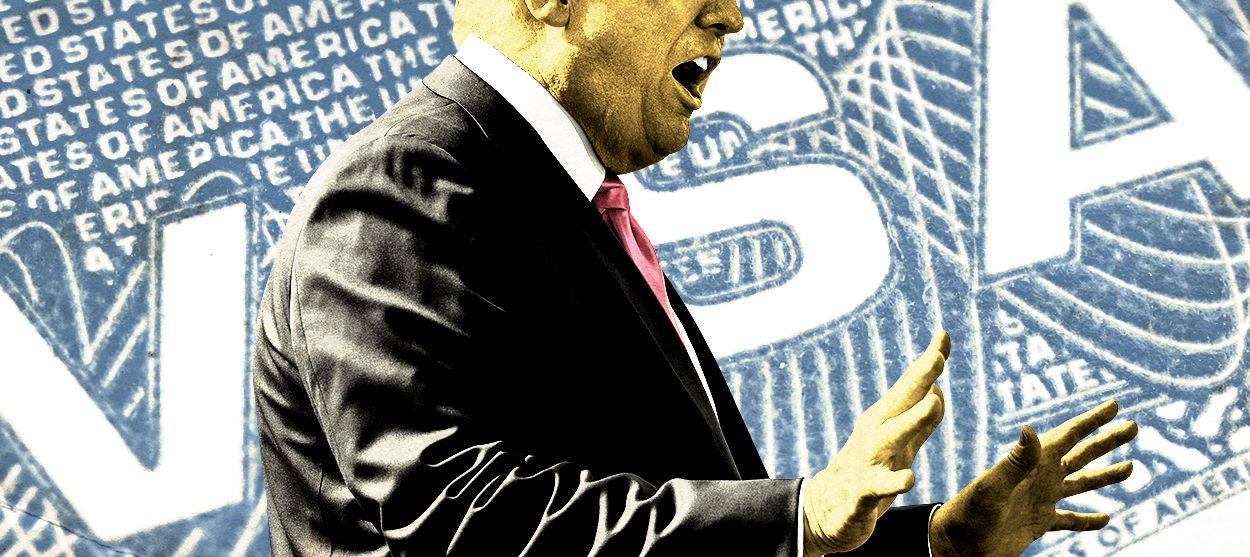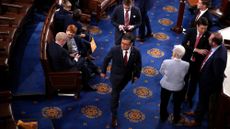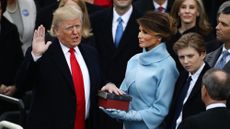Trump's visa ban is economic suicide
This election year stunt is going to be catastrophic for American innovation and entrepreneurship


American technology companies are unsurprisingly among the biggest critics of President Trump's decision on Monday to freeze new work visas, including those used by many tech workers and their families, through the end of the year. "This is a full-frontal attack on American innovation and our nation's ability to benefit from attracting talent from around the world,” said the head of a pro-immigration group funded by Silicon Valley.
That's not wrong, but let's momentarily put aside the wants and needs of Big Tech execs and employees. Here's a conundrum: American schools are nothing spectacular. For instance, high schoolers here rank 30th in the world in math, while their overall performance versus teenagers around the world has been stagnant for two decades. And concerns about the quality of U.S. secondary education go back a lot further than that.
And yet, somehow, the U.S. remains a country that continually pushes forward the state of scientific and tech progress. Sure, that means we have lots of big, profitable tech companies that generate lots of good, high-paying jobs. But being a science and tech leader is also key to our national security, as the AI worriers in Congress constantly remind us. It's also hard to imagine America's global reputation and brand being what it is if the U.S. were a tech laggard. Are the Avengers really going to have their headquarters in some backwater?
Subscribe to The Week
Escape your echo chamber. Get the facts behind the news, plus analysis from multiple perspectives.

Sign up for The Week's Free Newsletters
From our morning news briefing to a weekly Good News Newsletter, get the best of The Week delivered directly to your inbox.
From our morning news briefing to a weekly Good News Newsletter, get the best of The Week delivered directly to your inbox.
So how does America keep pulling off this trick, year after year, decade after decade? It's a question I once asked Stanford University economist Eric Hanushek, renowned for his work on all manner of education issues. His profound but simple explanation: "We are able to attract very smart people from abroad, keep them here, and have them work.”
He's undoubtedly right. Foreign-born workers account for a fifth of STEM workers with a bachelor's degree and more than half of those with a Ph.D. And in a paper released last April, researchers Sari Pekkala Kerr and William Kerr find that immigrants account for about a quarter of U.S. entrepreneurship and innovation. Immigration from Asia is a key driver, with Chinese and Indian ethnic inventors accounting for 22 percent of U.S. patents in 2018 versus fewer than 3 percent in 1975. You can't have an economically vibrant America without global talent coming here and thriving. America turning its back on that is something close to a national suicide attempt.
But let's not get carried away. This is only a temporary ban, right? We should hope so — but there are reasons to be doubtful.
First it's being implemented by an administration that repeatedly demonstrated its deep skepticism that immigration is good for America, much less fundamental to our national project. Cato Institute immigration expert Alex Nowrasteh speculates that this proclamation, like most of Trump's previous "temporary” bans, "will probably last longer than is necessary or won't be canceled at all until a Democratic president takes office,” especially given a recent Supreme Court case giving him broad power to limit immigrant entry.
Also not encouraging: The Trump White House explanation for the ban — to protect workers — is an evidence-free mess. Past government efforts to restrict immigration during downturns give little reason to expect success this time around. During the Great Depression, there were state and local efforts to repatriate Mexican workers, with some 400,000 to 500,000 eventually sent home. But the places that lost their Mexican workers either did no better than other cities and regions, or did worse.
A 2017 paper "The Employment Effects of Mexican Repatriations: Evidence from the 1930's” found that the "repatriation of Mexicans, who were mostly laborers and farm workers, reduced demand for other jobs mainly held by natives, such as skilled craftsman and managerial, administrative, and sales jobs.” Similarly, the early 1960s exclusion of some 500,000 seasonal Mexican workers to boost wages, mostly in the farm sector, also failed.
But is the ban really about economics, especially since the evidence so clearly points in the other direction? What more vivid example does Trump need of its stupidity than his attendance at the recent rocket launch by SpaceX, a company founded by immigrant Elon Musk?
The most charitable explanation is that the ban is an election year stunt to excite Trump's anti-immigration base. This comes, however, at the expense of people merely seeking to make a better life for themselves and their families. Even worse, this executive order will give aid and comfort to those right-wing nationalists and populists who think a strong, dynamic economy isn't worth the price of a less white America. They don't like immigrants be they undocumented, low skill, or high skill. If nothing else, we finally have clarity on that.
Want more essential commentary and analysis like this delivered straight to your inbox? Sign up for The Week's "Today's best articles" newsletter here.
Sign up for Today's Best Articles in your inbox
A free daily email with the biggest news stories of the day – and the best features from TheWeek.com
James Pethokoukis is the DeWitt Wallace Fellow at the American Enterprise Institute where he runs the AEIdeas blog. He has also written for The New York Times, National Review, Commentary, The Weekly Standard, and other places.
-
 Indonesia eyes the world stage
Indonesia eyes the world stageUnder The Radar Joining Brics could give the Southeast Asian nation new leverage on the world stage
By Chas Newkey-Burden, The Week UK Published
-
 Can Republicans navigate their narrow House majority?
Can Republicans navigate their narrow House majority?In the Spotlight This isn't the first time that a party has had no margin for error
By David Faris Published
-
 How does Inauguration Day work?
How does Inauguration Day work?The Explainer Part Constitution, part tradition
By Joel Mathis, The Week US Published